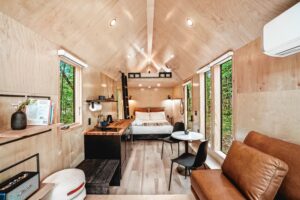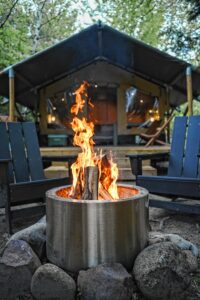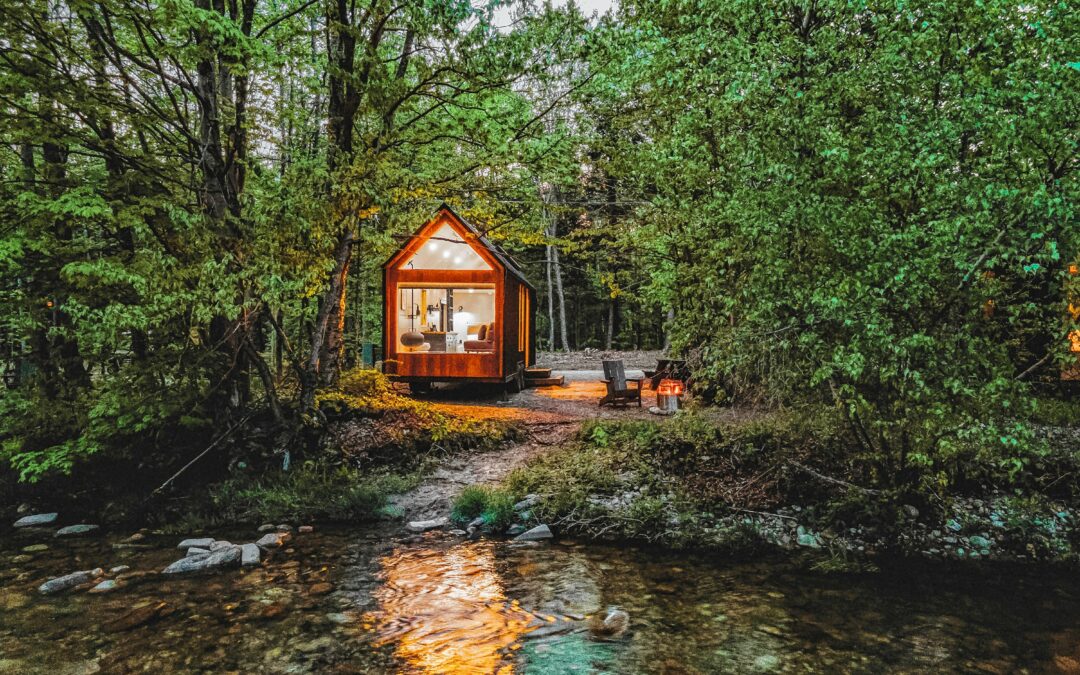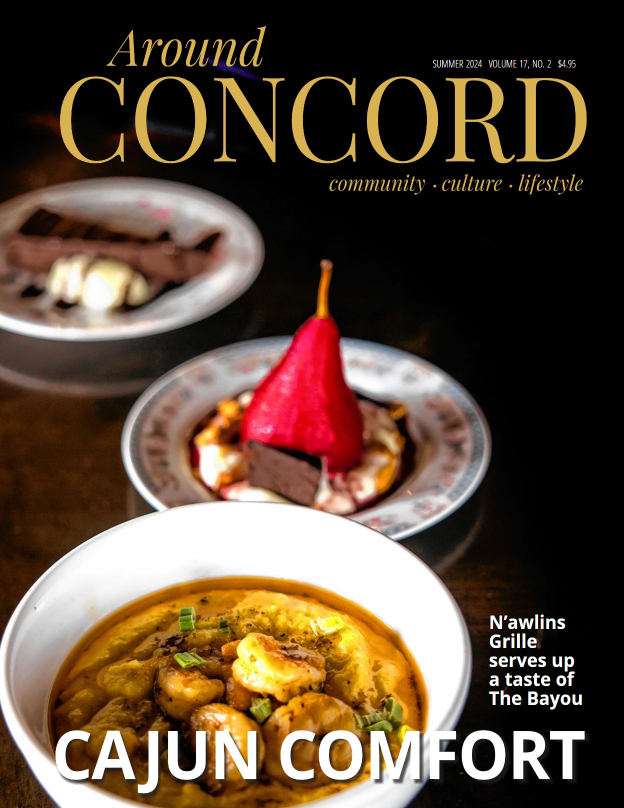Raindrops landed on the top of the tin roof with a kerplunk, so loud it started to drown out the soft music I had playing from the vintage radio in the corner of the cabin.
I shut it off and opened the windows as a slow mist unfurled along the brook. It crept in tendrils up the bank, stopping only when it reached the large glass window overlooking the stream. Mushrooms and spinach sizzled on the stovetop, a vat of water boiled to my right, a fellow camper’s dog barked in the distance as dishes clanged together in the communal sink. A hum of voices trailed through the trees.
Ah, glamping.
 Plating my food, I took a seat at the small table and spooned off bits of pork fat for my dog. With the tiny home now silent, I watched the rain drizzle around the fire pit. A slow-moving current dragged changing leaves in its embrace. Tomorrow, the river would be surging from the rainfall but for now, it ebbed and flowed over shallow rocks and estuaries. The sun dipped below the tree line, kissing the earth a final goodnight.
Plating my food, I took a seat at the small table and spooned off bits of pork fat for my dog. With the tiny home now silent, I watched the rain drizzle around the fire pit. A slow-moving current dragged changing leaves in its embrace. Tomorrow, the river would be surging from the rainfall but for now, it ebbed and flowed over shallow rocks and estuaries. The sun dipped below the tree line, kissing the earth a final goodnight.
I scraped my leftovers into the garbage and stacked my plates, preparing myself with a raincoat and Crocs for the trek across the muddy fields to wash them before tucking in for the night. Using the light of my phone balanced against a soap bottle, the nostalgia of summer camp as a kid flittered through my mind.
Without WiFi or ample internet connection, I grabbed a book and read until the raindrops put me to sleep.
“When we designed Lumen it was with the concept of a bedroom in the woods,” said Boris Mordkovich from the base cabin on site in Woodstock. “When you come and stay here, it’s designed for you to feel as close to nature as possible. Once the guests arrive, we have saunas, a brook that people swim in, a pond for fishing and a lot of hiking and walking trails in the area.”
The idea came to him and his wife, Susan Zhao, seven years ago when they packed up their van and road tripped from Boston to Argentina over the course of six months, stopping to camp along the way. Some of the couples’ best memories came from that trip, like sleeping atop the van in a rooftop tent, setting up a site in the middle of nowhere and meeting other people.
“That was a big inspiration that got us into camping in the first place and wanting to share this experience,” he said. “Being from Eastern Europe, things like a sauna in the winter and the overall simplicity of the Scandinavian design that you see in the cabins felt very comfortable and close to us.”
An immigrant from Lithuania, Mordkovich chose to incorporate his upbringing into the design, which was spearheaded by Zhao, who put together concepts for the four types of accommodations on site; a basic tent, a safari tent, a tiny home and a slightly larger tiny home. There are 35 units offering a mix of the four accommodations and most of them have waterfront views.
“We wanted to figure out how to design it with the outside experience for people with minimal camping experience to minimize stress and the headaches associated with camping,” he continued. “The guests that come to us right now usually have either one or multiple people that are intimidated by the outdoors and this is kind of a way for them to experience it without being worried or concerned about equipment.”
However, the tiny homes and tents don’t have bathrooms. Instead, campers have to walk a short distance to the bathhouse which is situated in the center of the property. Modeled with luxury in mind, the communal space hosts a row of four sinks, scented soaps and lotions, toiletries, round mirrors and a handful of toilet and shower stalls, accompanied by light elevator music.
Visitors won’t need to bring their own towels and wash cloths but sandals and a shower caddy are recommended.
 Without access to WiFi, campers are encouraged to embrace the outdoors, disconnect from the outside world and take advantage of the simplicity and minimalism the campground has to offer. Situated on 25 acres of land, wanderers can take time to explore, hike and spend time in nature away from the mundane routines of day-to-day life.
Without access to WiFi, campers are encouraged to embrace the outdoors, disconnect from the outside world and take advantage of the simplicity and minimalism the campground has to offer. Situated on 25 acres of land, wanderers can take time to explore, hike and spend time in nature away from the mundane routines of day-to-day life.
Though visitors often skew toward couples and families, a lot of solo travelers find their way to Lumen and will spend days at the campground, many returning throughout the year. Because the campground is closed during the winter, guests are encouraged to make the most of a hazy spring, a sheltered summer and a breezy fall. Close to the White Mountains in Woodstock, the temperatures up north are sometimes 10 degrees cooler than bigger cities and towns like Concord, Manchester and Boston, which are less than two hours south of the glampsites.
Before Mordkovich and Zhao bought the property, it was a family-owned campground for the last 40 years. About two years ago, the owners decided to retire and listed the campsite for sale. Mordkovich saw it as the opportunity he had been waiting for.
“It truly has everything that you need, and nothing that you don’t,” Mordkovich said.
To learn more or book a reservation, visit stayatlumen.com or email Mordkovich at borism@stayatlumen.com.


 View Print Edition
View Print Edition